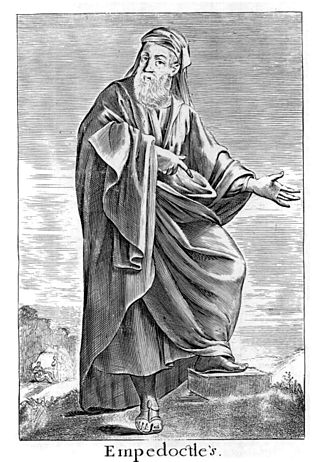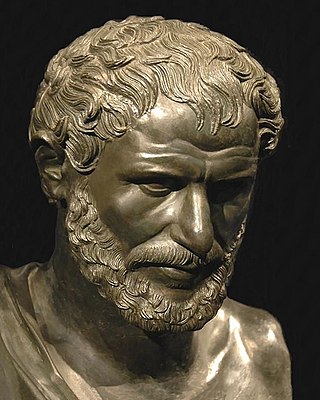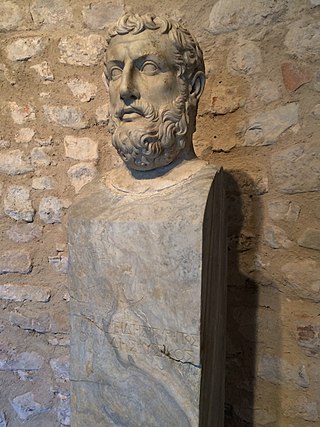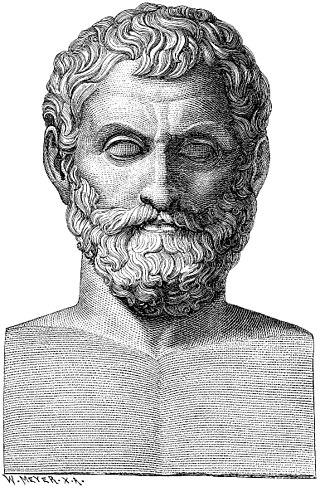Related Research Articles

Anaximander was a pre-Socratic Greek philosopher who lived in Miletus, a city of Ionia. He belonged to the Milesian school and learned the teachings of his master Thales. He succeeded Thales and became the second master of that school where he counted Anaximenes and, arguably, Pythagoras amongst his pupils.

Anaximenes of Miletus was an Ancient Greek, Pre-Socratic philosopher from Miletus in Asia Minor, active in the 6th century BC.

Classical elements typically refer to earth, water, air, fire, and (later) aether which were proposed to explain the nature and complexity of all matter in terms of simpler substances. Ancient cultures in Greece, Tibet, and India had similar lists which sometimes referred, in local languages, to "air" as "wind" and the fifth element as "void".

Empedocles was a Greek pre-Socratic philosopher and a native citizen of Akragas, a Greek city in Sicily. Empedocles' philosophy is best known for originating the cosmogonic theory of the four classical elements. He also proposed forces he called Love and Strife which would mix and separate the elements, respectively.

Heraclitus was an ancient Greek pre-Socratic philosopher from the city of Ephesus, which was then part of the Persian Empire.

Parmenides of Elea was a pre-Socratic Greek philosopher from Elea in Magna Graecia.

Thales of Miletus was a Greek mathematician, astronomer, statesman, and pre-Socratic philosopher from Miletus in Ionia, Asia Minor. He was one of the Seven Sages of Greece. Many, most notably Aristotle, regarded him as the first philosopher in the Greek tradition, and he is otherwise historically recognized as the first individual known to have entertained and engaged in scientific philosophy. He is often referred to as the Father of Science.

Pre-Socratic philosophy, also known as Early Greek Philosophy, is ancient Greek philosophy before Socrates. Pre-Socratic philosophers were mostly interested in cosmology, the beginning and the substance of the universe, but the inquiries of these early philosophers spanned the workings of the natural world as well as human society, ethics, and religion. They sought explanations based on natural law rather than the actions of gods. Their work and writing has been almost entirely lost. Knowledge of their views comes from testimonia, i.e. later authors' discussions of the work of pre-Socratics. Philosophy found fertile ground in the ancient Greek world because of the close ties with neighboring civilizations and the rise of autonomous civil entities, poleis.

The Theogony is a poem by Hesiod describing the origins and genealogies of the Greek gods, composed c. 730–700 BC. It is written in the Epic dialect of Ancient Greek and contains 1022 lines.

Ancient Greek philosophy arose in the 6th century BC, marking the end of the Greek Dark Ages. Greek philosophy continued throughout the Hellenistic period and the period in which Greece and most Greek-inhabited lands were part of the Roman Empire. Philosophy was used to make sense of the world using reason. It dealt with a wide variety of subjects, including astronomy, epistemology, mathematics, political philosophy, ethics, metaphysics, ontology, logic, biology, rhetoric and aesthetics.
Diogenes of Apollonia was an ancient Greek philosopher, and was a native of the Milesian colony Apollonia in Thrace. He lived for some time in Athens. He believed air to be the one source of all being from which all other substances were derived, and, as a primal force, to be both divine and intelligent. He also wrote a description of the organization of blood vessels in the human body. His ideas were parodied by the dramatist Aristophanes, and may have influenced the Orphic philosophical commentary preserved in the Derveni papyrus. His philosophical work has not survived in a complete form, and his doctrines are known chiefly from lengthy quotations of his work by Simplicius, as well as a few summaries in the works of Aristotle, Theophrastus, and Aetius.

Xenophanes of Colophon was a Greek philosopher, theologian, poet, and critic of Homer from Ionia who travelled throughout the Greek-speaking world in early Classical Antiquity.
Chaos is the mythological void state preceding the creation of the universe in Greek creation myths. In Christian theology, the same term is used to refer to the gap or the abyss created by the separation of heaven and earth.

Pherecydes of Syros was an Ancient Greek mythographer and proto-philosopher from the island of Syros. Little is known about his life and death. Some ancient testimonies counted Pherecydes among the Seven Sages of Greece, although he is generally believed to have lived in the generation after them. Others claim he was either a student of Pittacus, the teacher of Pythagoras, or a well-traveled autodidact who had studied secret Phoenician books.
The Ionian school of Pre-Socratic philosophy was centred in Miletus, Ionia in the 6th century B.C. Miletus and its environment was a thriving mercantile melting pot of current ideas of the time. The Ionian School included such thinkers as Thales, Anaximander, Anaximenes, Heraclitus, Anaxagoras, and Archelaus. The collective affinity of this group was first acknowledged by Aristotle who called them physiologoi (φυσιολόγοι), meaning 'those who discoursed on nature'. The classification can be traced to the second-century historian of philosophy Sotion. They are sometimes referred to as cosmologists, since they were largely physicalists who tried to explain the nature of matter.
In Greek mythology, the primordial deities are the first generation of gods and goddesses. These deities represented the fundamental forces and physical foundations of the world and were generally not actively worshipped, as they, for the most part, were not given human characteristics; they were instead personifications of places or abstract concepts.
Philosophy of matter is the branch of philosophy concerned with issues surrounding the ontology, epistemology and character of matter and the material world. The word matter is derived from the Latin word materia, meaning "wood", or “timber”, in the sense "material", as distinct from "mind" or "form". The image of wood came to Latin as a calque from the ancient Greek philosophical usage of hyle (ὕλη).
Apeiron is a Greek word meaning "(that which is) unlimited," "boundless", "infinite", or "indefinite" from ἀ- a-, "without" and πεῖραρ peirar, "end, limit", "boundary", the Ionic Greek form of πέρας peras, "end, limit, boundary".

The Exhortation to the Greeks is an Ancient Greek Christian paraenetic or protreptic text in thirty-eight chapters.
Charles H. Kahn was a classicist and professor emeritus of philosophy at the University of Pennsylvania. His work focused on early Greek philosophy, up to the times of Plato. His 1960 monograph on Anaximander was still as of 2020 the most important reference work on the subject, and his 1979 edition of the Heraclitus fragments likewise remained the most widely cited English translation of Heraclitus, more or less representing the 'standard interpretation' for non-expert scholars.
References
- ↑ ( /ˈɑːrki/ Ancient Greek : ἀρχή ;
- ↑ ἐξ ἀρχῆς
- ↑ ἐξ ἀρχῆς λόγος:
- ↑ (in plural: ἀρχαί),
- ↑ ἀρχή, A Greek-English Lexicon
- ↑ Peters Lexicon:1967:23
- ↑ Barry Sandywell (1996). Presocratic Philosophy vol.3. Routledge New York. ISBN 9780415101707. p.28,42
- ↑ William Keith Chambers Guthrie (2000). A History of Greek Philosophy. Cambridge University Press. pp. 58, 59. ISBN 9780521294201.
- ↑ West, Martin Litchfield (1984). The Orphic Poems. Clarendon Press. pp. 104–107.
- ↑ This is described as a large windy-gap, almost unlimited (abyss) where are the roots and the ends of the earth, sky, sea and Tartarus: online The Theogony of Hesiod. Translation H.G.Evelyn White (1914): 116, 736-744
- ↑ William Keith Chambers Guthrie (2000). A History of Greek Philosophy. Cambridge University Press. ISBN 9780521294201. p 83
- ↑ The phrase: "Divine is that which had no beginning, neither end" is attributed to Thales
- ↑ G.S.Kirk,J.E.Raven and M.Schofield (2003). The Presocratic Philosophers. Cambridge University Press. ISBN 9780521274555. p.24
- ↑ Aristotle-Metaph.A, 983, b6ff).
- ↑ Lindberg, David C., The Beginnings of Western Science (University of Chicago Press, 2010), pp. 28–9.
- ↑ <DK 7 B1a.>
- ↑ G.S. Kirk, J.E. Raven and M. Schofield (2003). The Pre-socratic Philosophers. Cambridge University Press. ISBN 9780521274555. p 89, 93, 94
- ↑ Simplicius, Comments on Aristotle's Physics (24, 13).<DK 12 A9, B1>
- ↑ Curd, Patricia, A Presocratics Reader: Selected Fragments and Testimonia (Hackett Publishing, 1996), pp. 9, 11 & 14.
- ↑ William Keith Chambers Guthrie (2000). A History of Greek Philosophy. Cambridge University Press. ISBN 9780521294201. p 55, 77
- ↑ G.S.Kirk, J.E.Raven and M.Schofield (2003). The Pre-socratic Philosophers. Cambridge University Press. ISBN 9780521274555. p 110
- ↑ William Keith Chambers Guthrie (2000). A History of Greek Philosophy. Cambridge University Press. ISBN 9780521294201. p 83
- ↑ Daniel.W.Graham. The internet Encyclopedia of Philosophy. Anaximenes.
- ↑ C.S.Kirk, J.E.Raven and M.Schofield (2003). The Pre-socratic Philosophers. Cambridge University Press. ISBN 9780521274555. p 144
- ↑ Barry Sandywell (1996). Presocratic Philosophy. Vol 3. Routledge New York. ISBN 9780415101707. pp. 142–144